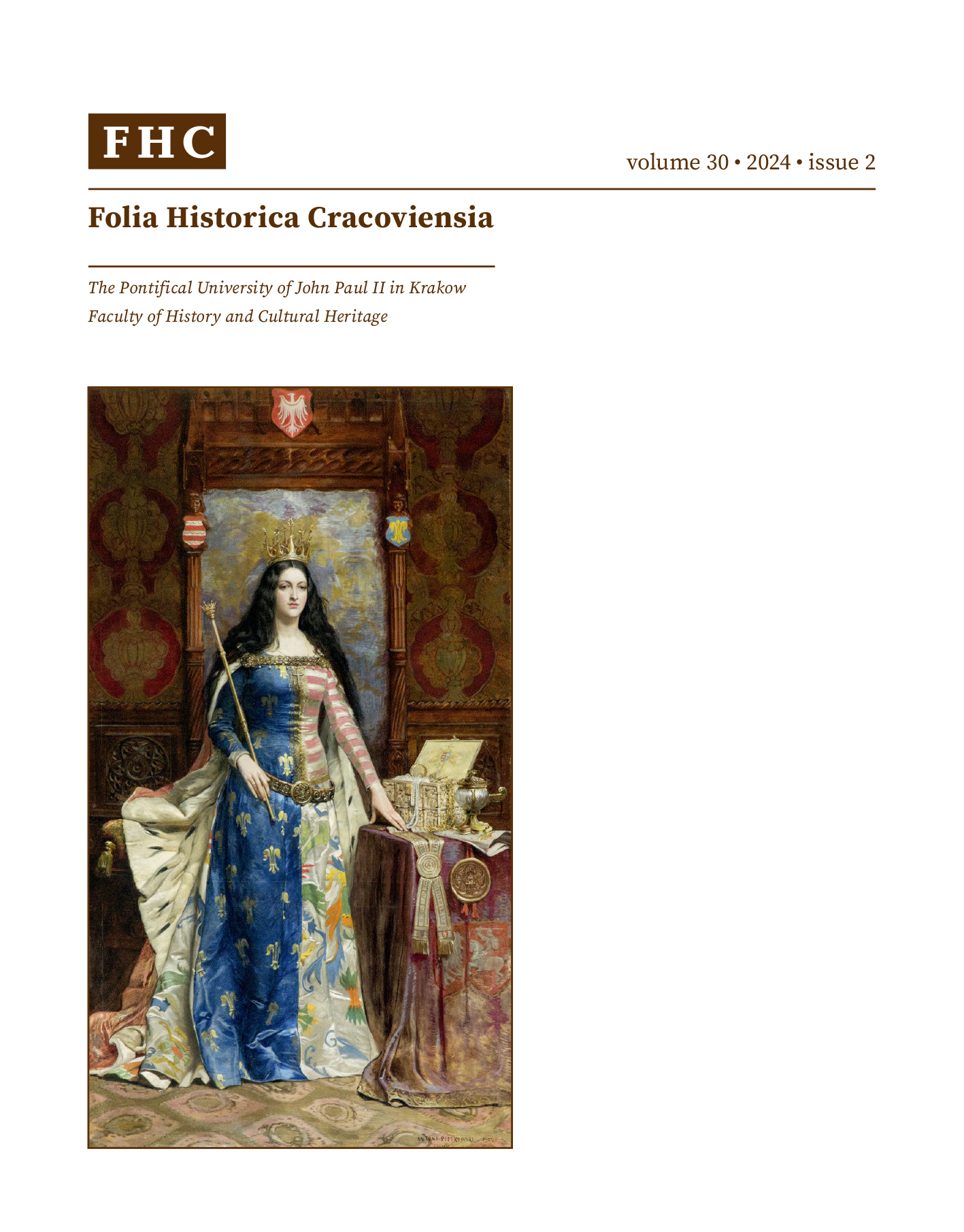Can a queen achieve Christian perfection? Spiritual advice from Henryk Bitterfeld of Brzeg for queen Jadwiga from the dedication Letter of the treatise “On the contemplative and active life”
DOI:
https://doi.org/10.15633/fhc.30209Keywords:
Dominicans, Church history, ecclesiology, Jadwiga of Anjou, Henryk Bitterfeld of BrzegAbstract
Henry Bitterfeld of Brzeg dedicated his treatise, “On contemplative and active life”, to Queen Jadwiga in response to her desire to pursue Christian perfection. This article aims to elucidate Bitterfeld’s conception of this perfection and to assess whether he believed it could be shared by the Polish queen. The investigation is situated within the broader 14th-century discourse on the role of the laity in the Church. Amidst a crisis of the papacy and the ecclesiastical hierarchy, the laity began to demand more subjective engagement and sought their own paths to achieving the fullness of Christian life. Bitterfeld emerges from the analysis as a theologian loyal to the traditional understanding of Christian perfection, as articulated by St. Thomas Aquinas. However, his writings also reveal the influence of the Prague intellectual milieu. He encourages the laity, including Queen Jadwiga, to embody, within the constraints of their ecclesiastical roles and state duties, the model practiced by mendicants. Central to this model is the “vita mixta”, which integrates both active and contemplative dimensions of life.
References
Eichstatatt, Universitatsbibliothek, rkps 709,709, fols 267r-299r.
Edycje krytyczne
Henricus Bittrfeld de Brega OP, Tractatus de vita contemplativa et activa, ed. B. Mazur, L. Seńko, R. Tatarzyński, Warszawa 2003.
Jindřich z Bitterfeldu, Eucharistické texty, ed. P. Černuška, Brno 2006.
Brown C. D., Pastor and laity in the theology of Jean Gerson, New York 1987.
Carey H. M., Devout literate laypeople and the pursuit of the mixed life in later medieal England, „Journal of Religious History” 14 (1987) issue 4, s. 362–381.
Clavis scriptorum et operum Medii Aevi Poloniae, t. 1, oprac. J. Kaliszuk, A. Pieniądz, P. Węcowski, K. Skwierczyński, Kraków 2019.
Engen J. van, Anticlericalism among the Lollards, w: Anticlericalism in late medieval and early modern Europe, eds. P. A. Dykema, H. A. Oberman, Leiden–New York 1994, s. 53–63 (Studies in Medieval and Reformation Thought, 51).
Engen J. van, Multiple options. The world of the fifteenth-century Church, „Church History” 77 (2008) no. 2, s. 270–271, https://doi.org/10.1017/S0009640708000541.
Engen J. van, Sisters and brothers of the common life: the Devotio Moderna and the world of the later Middle Ages, Philadelphia 2008.
Gerwing M., Malogranatum oder der dreifache Weg zur Vollkommenheit: Ein Beitrag zur Spiritualität des Spätmittelalters, München 1986.
Herold V., The spiritual background of the Czech reformation: precursors of Jan Hus, in: Companion to Jan Hus, eds. O. Pavlicek, F. Smahel, Leiden 2015, s. 69–95.
Marciniak K., Henryk Bitterfeld z Brzegu. Stan badań nad życiem i spuścizna pisarska, w: Henricus Bittrfeld de Brega OP, Tractatus de vita contemplativa et activa, eds. B. Mazur, L. Seńko, R. Tatarzyński, Warszawa 2003, s. IX–XXVIII.
Marin O., L’archevêque, le maître et le dévot: genèses du mouvement réformateur pragois (années 1360–1419), Paris 2005.
Marin O., The early Bohemian reform, w: A companion to the Hussites, eds. M. Van Dussen, P. Soukup, Leiden 2020, s. 25–62.
Nemec L., The Czech reform movement: „Devotio Moderna” in the fourteenth and fifteenth centuries, „Proceedings of the American Philosophical Society” 124 (1980) no. 5, s. 386–397.
Polc J. V., Duchovní proudy v Čechách ve XIV. století, w: Jan Hus na přelomutisíciletí, edd. M. Drda, F. J. Holeček, Z. Vybíral, Tábor 2001, s. 59–70 (Husitský Tábor, Supplementum I).
Vauchez A., Laity in the Middle Ages: the religious beliefs and devotional practices, Notre Dame 1993.
Vauchez A., Lay people’s sanctity in Western Europe: evolution of a pattern (twelfth and thirteenth centuries), w: Images of sainthood in medieval Europe, ed. R. Blumenfeld-Kosinski, T. Szell, Ithaca 1991, s. 21–32.
Weltsch R. E., Archbishop John of Jenstein (1348–1400): papalism, humanism and reform in pre-hussite Prague, Paris 1968.
Zajchowska-Bołtromiuk A., Henry Bitterfeld, Thomas Aquinas and identifying sources in late medieval texts. A case study of „De formatione et reformatione Ordinis Fratrum Praedicatorum”, „Studia Źródłoznawcze” 58 (2020), s. 55–64.
Downloads
Published
Issue
Section
License
Copyright (c) 2024 Anna Zajchowska-Bołtromiuk

This work is licensed under a Creative Commons Attribution 4.0 International License.
Authors who publish with this journal agree to the following terms:
- Authors retain the copyright and full publishing rights without restrictions, and grant the journal right of first publication with the work simultaneously licensed under a Creative Commons Attribution 4.0 International License that allows others to share the work with an acknowledgement of the work's authorship and initial publication in this journal.
- Authors are able to enter into separate, additional contractual arrangements for the non-exclusive distribution of the journal's published version of the work (e.g., post it to an institutional repository or publish it in a book), with an acknowledgement of its initial publication in this journal.
- Authors are permitted and encouraged to post their work online (e.g., in institutional repositories or on their website) prior to and during the submission process, as it can lead to productive exchanges, as well as earlier and greater citation of published work (See The Effect of Open Access).

